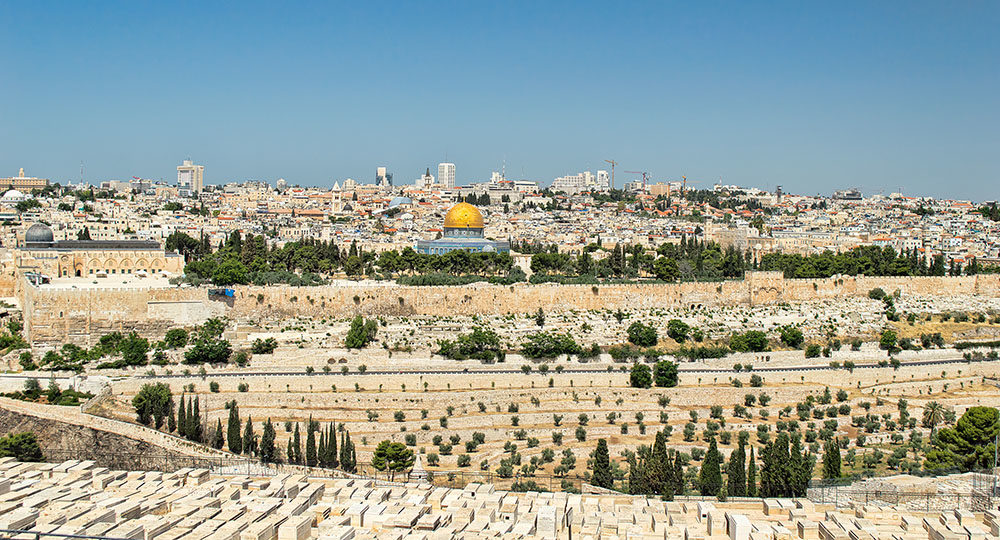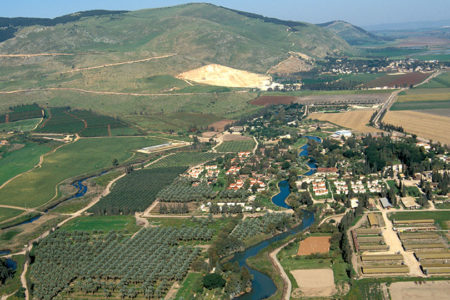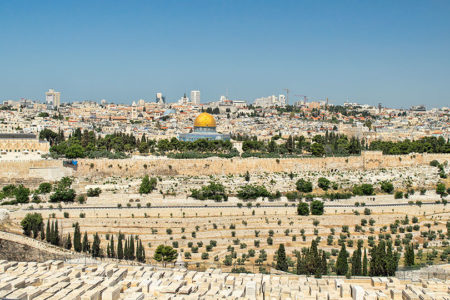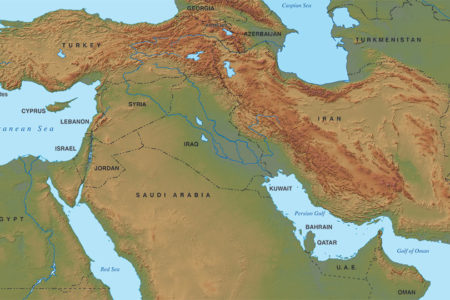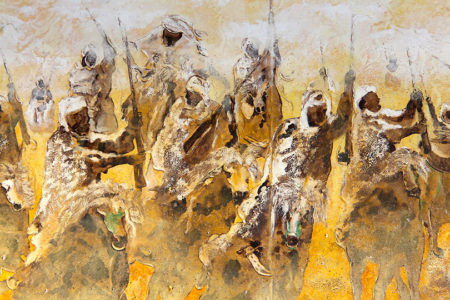The Rebirth of Israel Ezekiel 37
In 1897 Theodor Herzl invited 204 Jewish leaders to Basel, Switzerland, for the First Zionist Congress. He opened the conference with these words: “There is a land without a people, there is a people without a land; give the people without a land to a land without a people.” Then he made an astonishing prediction: “In five years or fifty years, we will have a homeland of our own.” His purpose was to put in place an organization that would legally secure a homeland for the Jewish people in what had formerly been the land of Israel. Herzl concluded the conference by saying, “If you will it, it is no dream.”
Restoration of Israel
Twenty-five hundred years earlier, Ezekiel had prophesied a national resurrection for Israel. The Spirit of the Lord brought him to a huge, open valley full of dried up human bones and made him circle them (Ezek. 37:1–2). It was evident the bones had been there for a long time.
The Lord told Ezekiel, “These bones are the whole house of Israel. They indeed say, ‘Our bones are dry, our hope is lost, and we ourselves are cut off!’” (v. 11).
Clearly, these bones do not represent a general, physical resurrection from the dead or a resurrection of the church or a physical resurrection of individual Jews, but “the whole house of Israel”—both Israel and Judah (v. 19). Israelites who survived the Babylonian Captivity of Ezekiel’s day—and Jewish people down through the centuries—saw themselves as “cut off” from all hope of a national identity in what was once Israel. They saw themselves with no hope of ever being resurrected and regaining nationhood status.
The Lord asked Ezekiel, “Son of man, can these bones live?”
Ezekiel answered, “O Lord Gᴏᴅ, You know” (v. 3). The prophet knew it was impossible to answer the Lord’s question, realizing that resurrecting the bones would take a miracle. Only God knew the answer.
God instructed Ezekiel, “Prophesy to these bones, and say to them, ‘O dry bones, hear the word of the Lᴏʀᴅ!’” (v. 4). Ezekiel was to be God’s voice and speak life back into the bones; that is, he was to be God’s agent to bring a life-giving message to Israel (vv. 5–6). Ezekiel obeyed; and while he prophesied, there was a “noise, and…rattling, and the bones came together….The sinews and the flesh came upon them, and the skin covered them over; but there was no breath in them” (vv. 7–8).
A mighty miracle took place when Ezekiel prophesied. No longer were the bones disconnected skeletons, but an entire body of Jewish people. The coming together represents the resurrection of the sons of Jacob as an entity in their own land in the latter days. Yet the lack of “breath” means they do not possess spiritual life (v. 8).
In the 19th century, Jewish people began returning to Israel. Russian Jews founded the city of Tel Aviv and Deganiah (the first collective settlement that was called a kibbutz). Before the State of Israel was founded, thousands of Jewish people returned to settle in the land; and by 1948, about 657,000 Jewish people resided there.1
On November 29, 1947, Theodor Herzl’s dream became a reality. The United Nations voted 33 to 13 (with 10 abstentions) to partition what was then called Palestine into two independent states: one Arab and one Jewish. Great Britain, which had administered the land since 1920 under a mandate from the former League of Nations, did everything in its power to hamper statehood for the Jewish people. But on May 14, 1948, the British evacuated; and Israel declared independence for the first time in 2,500 years.
Today Israel’s Jewish population numbers about 5.3 million.2 In the past 59 years, those returning have rebuilt and cultivated the land, bringing it back to life and beauty (36:8–12). But they do so in unbelief.
Some people question whether today’s Israel is the Israel referred to in the dry bones passage and believe the prophecy will not be fulfilled until the Messiah’s return. However, other prophetic passages show that Israel must be in its land as a recognized nation before the Messiah returns:
- Scripture clearly teaches that at the beginning of Daniel’s 70th week (the seven-year Tribulation), Israel—as a nation—confirms a binding agreement with a man who turns out to be the Antichrist (Dan. 9:27).
- Immediately prior to the midpoint of the Tribulation, a specific group of nations will attack Israel (Ezek. 38:5–6).
- At the end of the Great Tribulation, the entire world will attack Israel before the Messiah’s return (Zech. 14:2).
- If Israel were destroyed today, how many centuries would it be until the Jewish people were brought back to the land and established as a nation? Probably many, if ever. An analysis of the worldwide political alliances being formed today seems to indicate strongly that we are living in the last days and that Israel’s rebirth in 1948 is the very one predicted in Ezekiel 37.
Regeneration of Israel
The Lord commanded Ezekiel to prophesy over the bones a second time:
Prophesy to the breath, prophesy, son of man, and say to the breath, “Thus says the Lord Gᴏᴅ: ‘Come from the four winds, O breath, and breathe on these slain, that they may live’” (v. 9).
Ezekiel prophesied as he was commanded. Breath came into the bones, and they lived (v. 10). In that day, Israel will know that it was Jehovah who opened its graves and restored the nation (v. 13).
God said, “I will put My Spirit in you, and you shall live” (v. 14). This event will take place at the Messiah’s Second Coming when the Lord will pour His Spirit on Israel. The veil that has shrouded Jewish people for centuries will be lifted:
But even to this day, when Moses is read, a veil lies on their heart. Nevertheless when one turns to the Lord, the veil is taken away (2 Cor. 3:15–16).
At the Second Advent, when the Messiah returns to rescue the Jewish people from the Antichrist, they will look on Him “whom they pierced. Yes, they will mourn for Him as one mourns for his only son, and grieve for Him as one grieves for a firstborn” (Zech. 12:10). And they will come to faith.
Reunification of Israel
The Lord will bestow a number of blessings on the new nation.
Unity. First, God commanded Ezekiel to take two sticks, to write Ephraim on one and Judah on the other, and to join the sticks together. The stick of Judah represents the southern kingdom, and the stick of Ephraim represents the 10 tribes of the northern kingdom of Israel (Ezek. 37:15–17). Joining the two sticks visually illustrates all Israel being regathered and reunited as one people; when this takes place, Israel will never again be divided into two kingdoms (vv. 18–22, 25; cf. Mt. 24:31).
Theocracy. Second, Israel will have one king over it: “One king shall be king over them all;…David My servant shall be king over them, and they shall all have one shepherd” (vv. 22, 24). Some believe this passage refers to the resurrected King David who will reign with the Messiah over Israel. David is called “my servant” (v. 24), “king” (v. 22), and “shepherd” (v. 24). And under the Messiah, he will minister to the Jewish people.
Others teach that the passage refers to the Messiah, David’s greater Son, who will be King and Shepherd to the nation of Israel throughout the Kingdom Age (cf. Ps. 110:1; Mt. 22:41–46). This is none other than Jesus the Messiah, who will be given “the throne of His father David. And He will reign over the house of Jacob forever, and of His kingdom there will be no end” (Lk. 1:32–33).
Purity. Israel will be cleansed from all her defilement of sin, idolatry, and detestable things (abominations) at the Lord’s Second Coming. At that time, a redeemed remnant will reside as a holy people in the land. God will again call Israel “My people,” and the believing remnant will embrace the Lord as God (v. 23; cf. 36:24–28). Then Israel will walk in God’s judgments and observe all His statutes (37:24).
Security. Israel will have all the land promised to Jacob, as spelled out in the Abrahamic Covenant (Gen. 28:12–15). Ezekiel said, “Then they shall dwell in the land that I have given to Jacob My servant, where your fathers dwelt; and they shall dwell there, they, their children, and their children’s children, forever” (Ezek. 37:25).
Spirituality. God said, “I will make a covenant of peace with them, and it shall be an everlasting covenant with them” (v. 26). This is the New Covenant promised to Israel (Jer. 31:31–34). God will cleanse the redeemed, give them a new heart, and put a new spirit within them; they will be filled with the Holy Spirit and walk in His statutes and judgments (Ezek. 36:24–26). In that day, Israel will experience the peace of God.
Intimacy. The Lord said, “I will be their God, and they shall be My people” (37:27). This point is the most important promise given to Israel, but few commentators mention it. In this provision, God will restore the nation of Israel to intimate communion with Him and call them “My people.”
Sanctuary. “I will set My sanctuary [Temple] in their midst forevermore,” said the Lord. “My tabernacle [literally, “habitation” or “dwelling”] also shall be with [over] them; indeed I will be their God, and they shall be My people” (vv. 26–27). This sanctuary is the Millennial Temple that will be constructed on the Temple Mount once the Messiah returns. Ezekiel described the Temple and its priesthood and worship in great detail in chapters 40–46.
Sanctity. “The nations also will know that I, the Lᴏʀᴅ, sanctify Israel, when My sanctuary is in their midst forevermore” (v. 28). In the Millennial Kingdom, the world will recognize that it was God who redeemed Israel, reunited the nation, and restored the Jewish people to their land. This fact, along with the erection of the Temple, will convince the nations that Israel’s God is the one true God of the universe.
Theodor Herzl said, “If you will it, it is no dream.” The complete fulfillment of Ezekiel’s prophecy and Israel’s dream will come to fruition at the Messiah’s return. God said it, and He will perform it.
ENDNOTES
- Martin Gilbert, The Routledge Atlas of the Arab-Israeli Conflict, 7th ed. (London: Routledge, 2002), 49.
- Ruth Eglash and JPost.com staff, “Israel’s population stands at 6,990,700,” September 19, 2006 <jpost.com/servlet/Satellite?c=JPArticle&cid=1157913660628&pagename= JPost%2FJPArticle%2FshowFull>.
